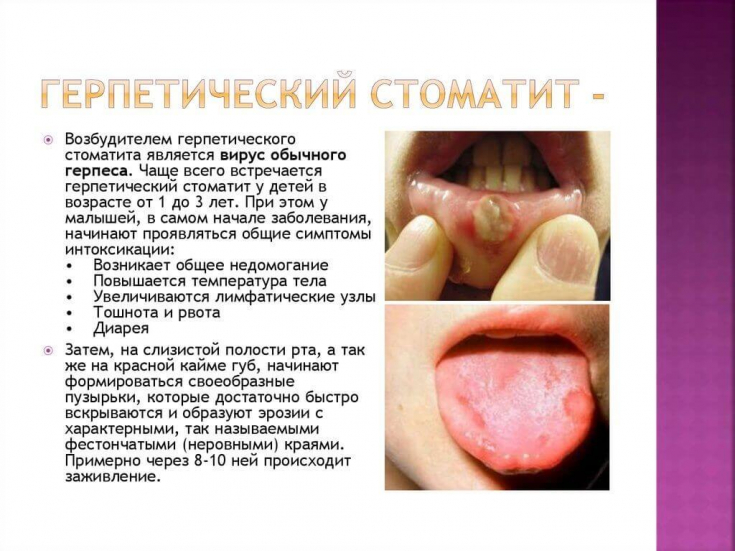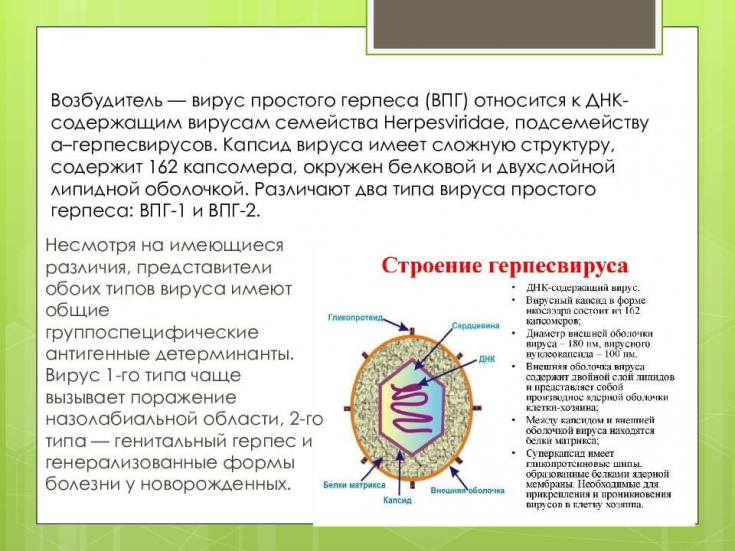Clinical manifestations of herpes virus in the oral cavity are secondary signs of the disease, therefore, etiotropic therapy is used for treatment, aimed at a certain type of virus, pathogenetic − to correct the immune and inflammatory response of the body, as well as symptomatic therapy to eliminate the clinical manifestations of infection in the oral cavity, reduce pain.
Learn in the article on estet-portal.com about effective etiotropic therapy of the herpes virus in the practice of a dentist.
- Approaches to the treatment of herpes virus in dentistry
- Development of resistance in the treatment of herpes virus
- Clinical confirmation of the effectiveness of denotivir for treatment of herpes virus
Approaches to the treatment of herpes virus in dentistry
The drug of choice for the complex treatment of the herpes virus in dentistry is denotivir . The results of numerous studies have proven the antiviral, anti-inflammatory, antibacterial, antifungal, analgesic and immunomodulatory effects of denotivir.
Follow us on Instagram!
It has also been shown to be active against Herpes simplex types 1 and 2 (HSV1, 2), Herpes zoster, Vesicular stomatitis virus (VSV). Denotivir − isothiazole derivative, which has a direct antiviral effect through direct inhibition of viral DNA polymerase and interaction with the glycolyproteins of the herpes virus envelope. This leads to blocking the replication of the herpes virus by 99% and its direct inactivation. This process is typical only for systemic drugs (cidofovir, foscarnet).

Read also: Gum recession: causes and serious consequences of teeth exposure
Denotivir differs from purine nucleoside analogues (acyclovir and penciclovir) in terms of the mechanism of antiviral action, which have no initial activity against the Herpes simplex virus. Activation of acyclovir occurs only after conversion to acyclovir triphosphate. This process is initiated by the viral enzyme thymidine kinase. Then, in the presence of cellular kinases, the second and third phosphorylations occur. And only then acyclovir triphosphate as a substrate for viral DNA polymerase is included in the replication of viral DNA and stops the process of reproduction herpes virus.
Development of resistance in the treatment of herpes virus
According to literature sources, 57% of patients with recurrent herpes virus develop resistance to acyclovir during treatment. The mechanism of the emergence of resistance to acyclovir is explained by a deficiency of viral thymidine kinase, damage to the substrate specificity of this enzyme, or a change in the viral DNA polymerase. Unlike acyclovir, denotivir is an active antiviral drug. It does not require activation by a viral enzyme and directly inhibits viral DNA polymerase.
Read also: Depulped tooth: 5 rules for caring for a tooth without a nerve
Since the implementation of the therapeutic effect of denotivir is not related to the biochemistry of enzymatic transformations, it begins to act from the moment of application. In addition, its use in the prodromal period can prevent the development of herpetic manifestations at the site of application.
Due to the antibacterial action of denotivir, it prevents secondary bacterial infection in herpes.
This drug also has a pronounced anti-inflammatory effect: it inhibits the activity of cytokines − IL-1, IL-6, TNF-.alpha. and has a stabilizing effect on cell membranes. This ensures the elimination of signs of inflammation: redness, swelling, burning and pain.
Clinical confirmation of the effectiveness of denotivir for the treatment of herpes virus
Recent studies have been conducted on the efficacy of denotivir in patients with herpes labial virus affected by HSV type 1.
The presence of herpes virus was established on the basis of the medical history, examination data, as well as the detection of HSV DNA by polymerase chain reaction in the blood. The study of the immune status consisted of identifying the main subpopulations of CD3 +, CD4 +, CD8 +, CD72 +, CD16 + lymphocytes. The content of immunoglobulins A, M, G, circulating immune complexes in blood serum was also determined. Functional activity of neutrophils − production of reactive oxygen species, which provide bactericidal action, − determined by the nitrosine tetrazolium test (NBT-test).
The results of the study showed that in patients with herpes labialis who used denotivir, after 2-3 days of therapy, redness and swelling at the site of the lesion significantly decreased, pain and itching also disappeared.
By the end of the study, 100% of the patients had no symptoms of the disease. Due to the antibacterial effect of denotivir, the course of the disease was not complicated by a secondary infection, so there was no hyperpigmentation at the site of the lesion. The data obtained allow us to conclude that antiherpetic drugs, such as denotivir, are effective in the treatment of dental patients with herpes labial virus.

Avoiding Complications After Tooth Extraction: Current Recommendations
So, viral lesions of the oral cavity are common among dental patients and occur in both children and adults. Primary infection with the herpes virus occurs mainly in childhood, and in adults, clinical manifestations of a viral infection are observed when the virus is reactivated and the immune response is reduced. Timely full diagnosis and the use of drugs of complex action increase the effectiveness of the treatment of this pathology.
More useful information on our channel in Youtube:







Add a comment